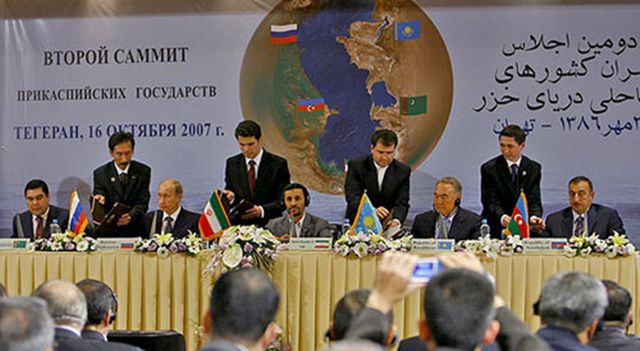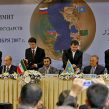
Littoral States Struggle to Agree on the Caspian Settlement
Publication: Eurasia Daily Monitor Volume: 8 Issue: 88
By:

The Caspian nations have reiterated pledges to solve their differences later this year ahead of the Caspian summit in Moscow, but they apparently continued to disagree on a number of key issues. During a meeting in Baku on April 26 – 27, representatives of the five countries that border the Caspian Sea (Azerbaijan, Kazakhstan, Iran, Russia and Turkmenistan) made yet another attempt to reach an agreement on the Caspian’s division.
On April 26 – 27, a meeting of the special working group was held in Baku in a bid to reach a consensus on a draft of the Caspian Convention, a legally-binding treaty to determine the future Caspian division, acceptable to all littoral states. On April 27, Azerbaijan’s Caspian envoy, Deputy Foreign Minister Khalaf Khalafov, announced that the meeting was aimed at achieving progress on the Caspian Convention ahead of the 4th Caspian summit in Moscow. However, he conceded that envoys from the five littoral states did not agree on some issues, including sea transportation and military activities in the Caspian. “We are yet to agree” on proposals to demilitarize the Caspian and regulate military activities, Khalafov said. However, the littoral states aim to secure equal security for all nations in the region, he said (Interfax, April 26-27).
Moscow also voiced support of the Caspian settlement. “We are all interested” in adoption of the Caspian Convention and creating a framework of multilateral cooperation, explained Russian envoy Alexander Golovin. He also said the Caspian Summit in Moscow should finalize a draft of the Caspian Convention. The littoral states have no plans for an arms race and the Caspian should remain a region of peace and cooperation, Golovin argued (Interfax, April 27).
Kazakhstan’s envoy, Zulphia Amanzholova, largely echoed Russian arguments. She also voiced hopes that the upcoming meetings in Moscow could facilitate the process to draft agreements of the Caspian settlement (Interfax, April 27). However, statements by other delegates sounded less optimistic. Turkmenistan’s envoy, Myrat Atadzhanov, argued that some provisions of the draft Caspian Convention required further negotiations (Interfax, April 27).
Furthermore, Tehran reiterated its strong opposition to any separate deals between littoral states. Iran does not recognize bilateral agreements between Azerbaijan, Kazakhstan and Russia, said Iranian envoy Muhammed Mehdi Ahunzade. In the absence of a multilateral Caspian Convention, treaties between the USSR and Iran of 1921 and 1940 still remain valid, he said (Interfax, April 27). The meeting was supposed to be held at the level of deputy foreign ministers, but Russia and Iran only sent low-level envoys. Russia’s Caspian envoy, Deputy Foreign Minister Sergei Ryabov, as well as Iranian Caspian envoy, Mehdi Safari, apparently refrained from attending the meeting, thus undermining its significance.
Therefore, following years of negotiations on the Caspian Convention, the littoral states remain divided on variety of issues, including the seabed and sea surface delimitation, rules of military activities and transit, as well as demilitarization. Moreover, despite official optimistic pronouncement in late April, diplomats revealed no time-frame for the upcoming Caspian summit in Moscow.
Russia has long advocated a so-called “modified median line” solution for the division of the Caspian, leaving the surface waters for common use, including by naval forces. In contrast, Iran advocates a complete division of the whole sea that would not allow Russian naval forces to travel freely in the Caspian.
The first Caspian summit, held in Ashgabat in April 2002, did not adopt any agreements. The next Caspian summit was subject to endless delays. It was originally expected to be held in Tehran in the second half of 2004, but it was delayed until October 2007, and the participants agreed not to allow third-party ships to enter the Caspian Sea. In September 2009, the leaders of four former Soviet littoral states, Azerbaijan, Kazakhstan, Russia and Turkmenistan, met in Kazakhstan’s Caspian port Aktau. Iranians were not invited and issued strong protests, but other Caspian leaders argued their meeting in Aktau was not aimed at isolating Iran.
At a summit meeting in Baku on November 18, 2010, the leaders of all five states signed an agreement on security cooperation. It stipulates that only the littoral states are responsible for Caspian security, while security cooperation could be carried out in bilateral and multilateral formats. The Caspian Convention has been under discussion since 1991 and respective special Caspian envoys have been meeting since 1996. Russia, Kazakhstan and Azerbaijan support the so-called median lines division principle, which would leave Iran with the smallest part of the Caspian. According to treaties from 1921, 1940 and 1970, Iran controls just 13 percent of the Caspian Sea and is poised to benefit from equal division, with the five littoral states each receiving 20 percent of the sea.
Kazakhstan is set to become a major beneficiary of the so-called median lines division principle, which would leave it with the largest part of the Caspian. Iran and Turkmenistan, potential losers of the median line division principle, oppose this solution. Moscow argued that in the absence of an overall agreement, bilateral agreements on the Caspian were needed. In the wake of the unsuccessful Caspian Sea summit in 2002, Moscow managed to clinch bilateral Caspian deals with Kazakhstan and Azerbaijan. However, Iran has repeatedly said it would not recognize any bilateral or trilateral deals on the Caspian division before an overall Caspian Convention is signed by all five littoral states.
The previous Caspian summits were subject to endless delays due to continued serious disagreements. It remains to be seen whether the fourth Caspian summit can convene in Moscow as scheduled later this year, as the littoral states apparently struggled to agree on the crucial issues of the Caspian division.




